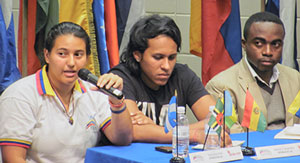Despite Washington’s efforts
ALBA holds conference in U.S.
Published Apr 5, 2012 7:57 PM
By Thomas J. Michalak
Chicago
The Bolivarian Alliance for the Peoples of Our America – People’s Trade Treaty (ALBA-TCP) held a conference at DePaul University here on March 22-23. Despite Washington’s refusal to allow Cuban representatives to attend the conference, or even be Skyped in, the revolutionary island’s message came through loud and clear.
|
Maria Helena Ramirez and Yosjuan Pina Narvaez
discussed Venezuela’s gender diversity
movement, shown here with Dr. Luther Castillo,
a Honduran graduate of the Latin American
School of Medicine (ELAM) from the Foundation
for the Health of Our People.
WW photo: Cheryl LaBash
|
The countries of ALBA-TCP include Antigua and Barbuda, Cuba, Bolivia, Nicaragua, Ecuador, St. Vincent and the Grenadines, and Venezuela. Their goal is simple: to create a better life for the people of their countries through human development and solidarity, not corporate greed.
ALBA represents a dramatic shift from the Latin America of the past. Since Europeans first arrived in the Western Hemisphere at the end of the 15th century, Latin America has been under the boot heel of colonialism and then imperialism, whether from Spanish colonists or the Monroe Doctrine of the United States.
Most of the more recent attempts by the people of Latin America to secure self-determination have been crushed, like the U.S.-engineered assassination of Chilean President Salvador Allende in 1973. But Cuba and Venezuela remain free, although in a day-to-day struggle against violent foreign aggression.
Ambassadors Francis Campbell Hooker of Nicaragua, Jorge Bolaños Suárez of Cuba, Freddy Bersatti Tudela of Bolivia and Ángelo Rivero of Venezuela were scheduled to attend the conference.
However, Bolaños Suárez, stationed at the Cuban Interests Section in Washington, D.C., was refused permission by the State Department to travel to Chicago and was not even allowed to Skype into the conference over the Internet. In light of this, he prepared a speech that was delivered by Felix Masud, a professor at the university who co-sponsored the event.
Also in attendance were various social activists from ALBA nations representing causes such as the lesbian, gay, bi and trans movement and the Foundation for the Health of Our People.
ALBA, not surprisingly, does not receive the attention in the imperialist media that it rightly deserves. Its immense accomplishments based on unity around satisfying human needs have changed the lives of millions of people for the better. Since its founding in 2004, for example, ALBA has eradicated poverty for more than 11 million people through providing universal education and health care, both programs completely dedicated to increasing the well-being of the population.
Venezuela recently declared itself to be 100 percent free of illiteracy, making it the second country in the region — after Cuba — to be able to make such a claim.
Cuba’s Latin American School of Medicine (ELAM) has been instrumental in providing education to aspiring physicians and medical care to those who otherwise would not have it. After a devastating earthquake hit Haiti in 2010, student doctors from ELAM joined Cuban doctors there on the second day to provide what aid they could — free of charge.
Since its establishment in 1999, ELAM has provided health care that saved the lives of millions. In 2006, Venezuela started the construction of a sister university that would serve the same function as its Cuban counterpart.
ALBA represents a framework for how international organizations connecting nations should operate: to promote the welfare of humanity as a whole. Some people in the U.S. have dubbed ALBA, “Latin America’s G8 for the 99%.” It doesn’t represent imperialist ambitions. It represents what nations can do for the betterment of their own people, no matter how small or poor the nation might be.
Articles copyright 1995-2012 Workers World.
Verbatim copying and distribution of this entire article is permitted in any medium without royalty provided this notice is preserved.
Workers World, 55 W. 17 St., NY, NY 10011
Email:
[email protected]
Subscribe
[email protected]
Support independent news
DONATE


